Sunday, 13 March 2022
Angola prepares ACP summit
MPs recommend training on administrative procedure
Angola sets USD 10,000 ceiling for travelers
Angola and Japan analyze TICAD ministerial meeting
Angola records 34 new cases of covid-19
Ukraine conflict: Growing numbers of firms pull back from Russia
Thirty years ago when communism collapsed in the Soviet Union, Western firms stepped up their presence in Russia.
The arrival of big Western companies symbolised the start of a new era with Russians becoming eager consumers of brands ranging from fast-food chain McDonalds to Levi jeans and luxury goods.
Now, in the wake of President Putin’s invasion of Ukraine, a growing number of firms have suspended activities in Russia.
So which firms, in which sectors, are exiting and why have others held back?
Fast food and drinks giants
McDonald’s Coca-Cola, Starbuck and Heineken are the latest companies to announce they are halting business in Russia after mounting pressure to act.
McDonald’s said it was temporarily closing its roughly 850 restaurants in Russia, while Starbucks also said its 100 coffee shops would shut.
The firms initially remained tight lipped over the conflict, but took action because shareholders “wouldn’t stand” for the continued generation of profits from Russia, says Anna MacDonald, a fund manager at Amati Global Investors.
“It was affecting their share prices and the feeling was that it was just utterly inappropriate to continue to do so,” she told the BBC.
Pepsi, which has a much larger presence in Russia than rival Coca-Cola, said it was halting the production and sale of Pepsi and other global brands in Russia, but the company, which employs 20,000 people there, said it would continue to offer other products.
Food companies Nestle, Mondelez, Procter & Gamble and Unilever have halted investment in Russia, but said they would continue providing essentials.
Retail
The world’s biggest cosmetics firm L’Oréal and rival Estee Lauder are both closing shops and ceasing online sales. Estee Lauder, whose brands include Michael Kors, DKNY, Clinique and Bobbi Brown, has had a presence in the country for about 30 years and Russia was where it had some of its strongest sales.
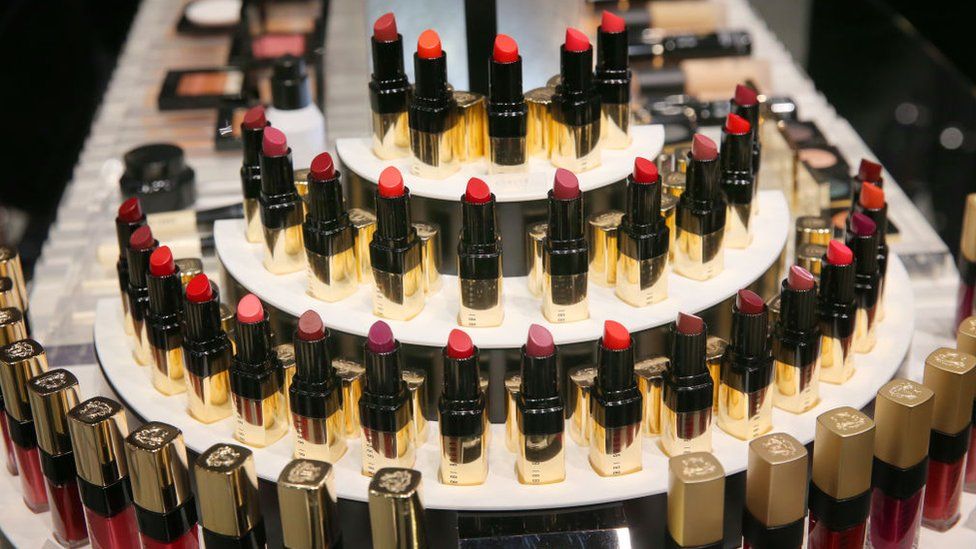
In fact, Russia was the fifth largest European retail market globally last year, valued at £337.2bn. So some brands may not want to burn their bridges, if there’s a chance of returning at a later date.
That is why many firms, including other luxury retailers like Burberry and Chanel, simply say they are “suspending” sales and temporarily shutting stores rather than withdrawing altogether, says Chris Weafer, chief executive of consulting firm Macro-advisory Limited.
With sanctions limiting forms of payment and huge uncertainty over future prices and consumer appetite, the business climate is “extremely challenging” he adds, making the decision to hit pause easier.
The world’s biggest fashion retailers H&M and Zara-owner Inditex, which has 502 stores in the country, for example have already suspended sales in Russia, citing “tragic developments” in Ukraine. Other brands like Nike have simply said they can’t currently guarantee delivery of goods to customers in Russia.
More brands are likely to follow suit, according to Maureen Hinton of retail consultancy Global Data. Boohoo, Swedish furniture giant Ikea and Japanese clothing retailer Uniqlo which initially kept its 49 shops Russian stores open ,saying clothes were a ”necessity of life”, are some of the other names to have now cut ties.
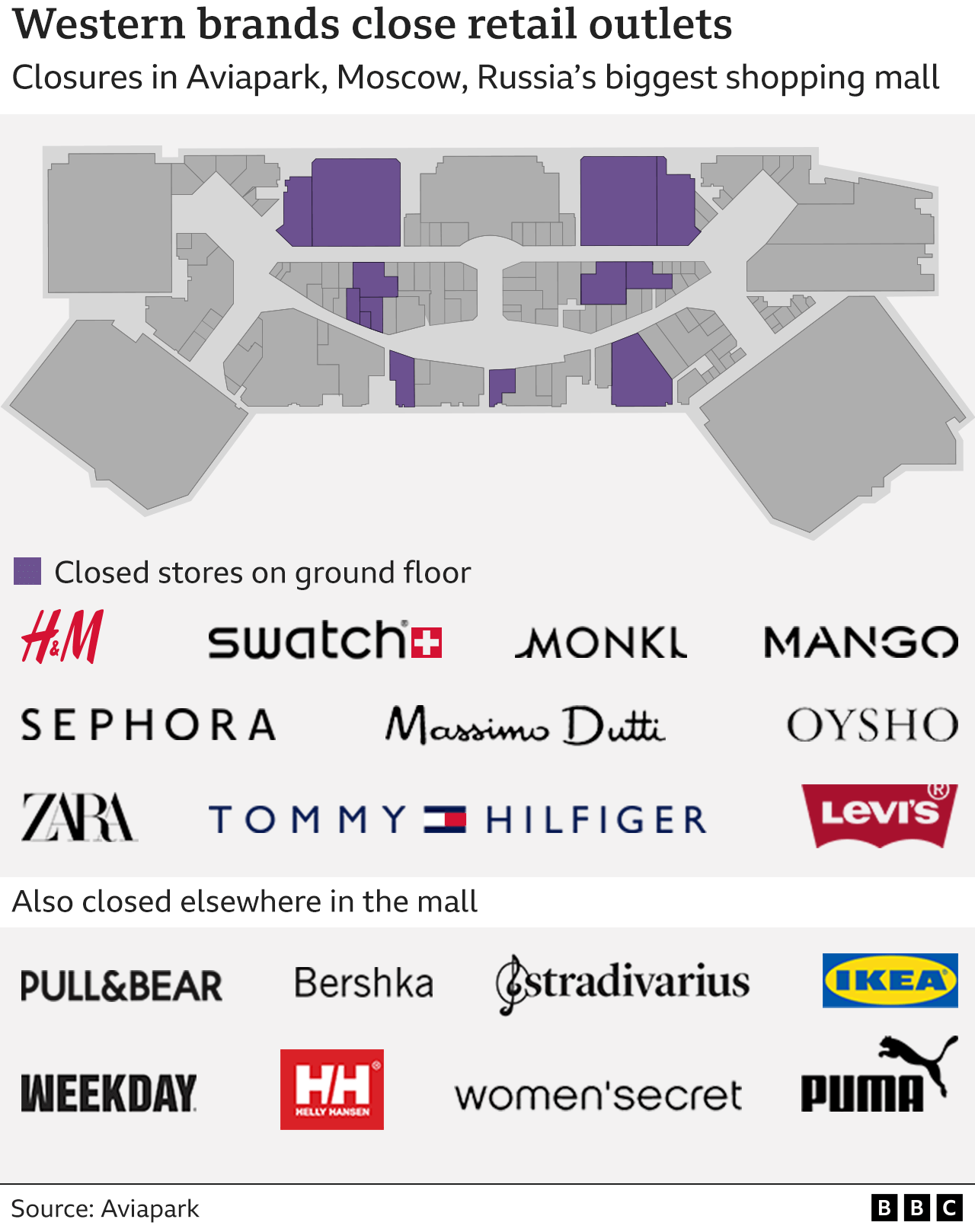
Even Levi’s, the jeans brand that became a symbol of post-Soviet business in Russia, has closed its shops. The all-American jeans firm said about 4% of its total net sales came from Eastern Europe and Russia last year, but “any business considerations are clearly secondary to the human suffering experienced by so many”.
Technology
Japan’s Sony and Nintendo suspended deliveries of gaming consoles, and Sony suspended the launch of racing game “Gran Turismo 7”.
Apple has also halted all of its product sales in Russia, and limited other services such as Apple pay and Apple maps. Its shops have closed too.
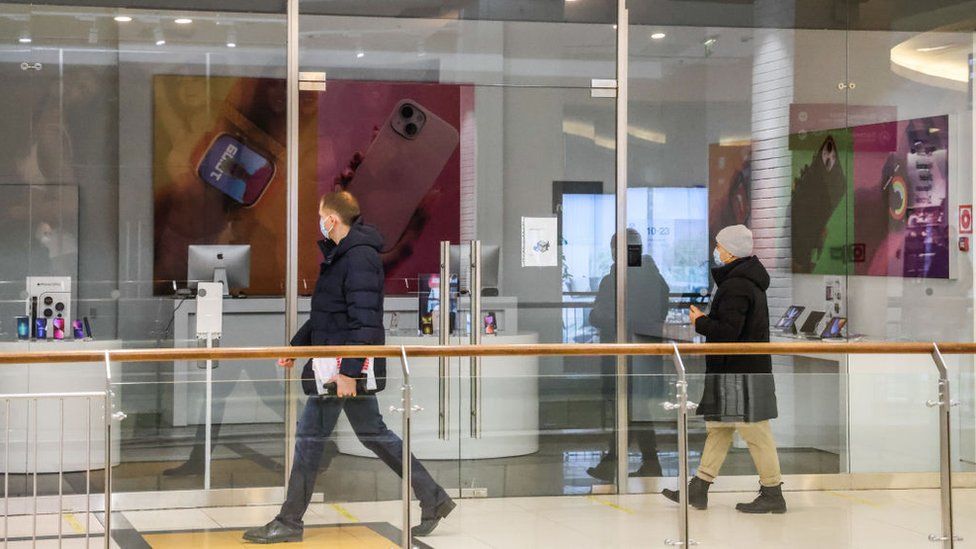
For a firm like Apple selling imported items, that’s a relatively straightforward decision to take, suggests Macro-advisory’s Chris Weafer.
“Companies do not want to be associated with the Russian regime and what’s happening in Ukraine,” he says. Their Russian business may be profitable, but “the rest of the world is more important” when it comes to reputational risk.
Some tech companies, flooded by misinformation, are also restricting Kremlin-linked media outlets posting on their platforms. Facebook was blocked in Russia after it said it had refused to stop fact-checking and labelling content from state-owned news organisations.
Meanwhile, TikTok has blocked all non-Russian and suspended live streaming, although it is allowing historical content uploaded by domestic accounts to stay online, including videos by state-backed media services.
Consultancy firms
Large consultancy and law firms were some of the first to set up a presence in Russia after the collapse of the Soviet Union but they mostly operate out of the spotlight.
All of the Big Four accounting groups – Deloitte, KPMG, EY and PricewaterhouseCoopers (PwC) – have said they will no longer have a member firm in Russia because of the invasion. Top-tier law firm Freshfields says it will no longer work with any clients linked to the Russian state either.
Others say they are reviewing their client base and Russian links.
A senior executive for consultancy firm McKinsey, for example, wrote online that the company would “no longer serve” any government or state-owned entities in Russia. According to McKinsey’s website, it serves 21 of the 30 biggest Russian companies.
Oil and gas
When the conflict in Ukraine broke out, energy firms came under immediate pressure. And that is set to intensify now the UK, US and UK have announced bans or curbs on Russia oil and gas.
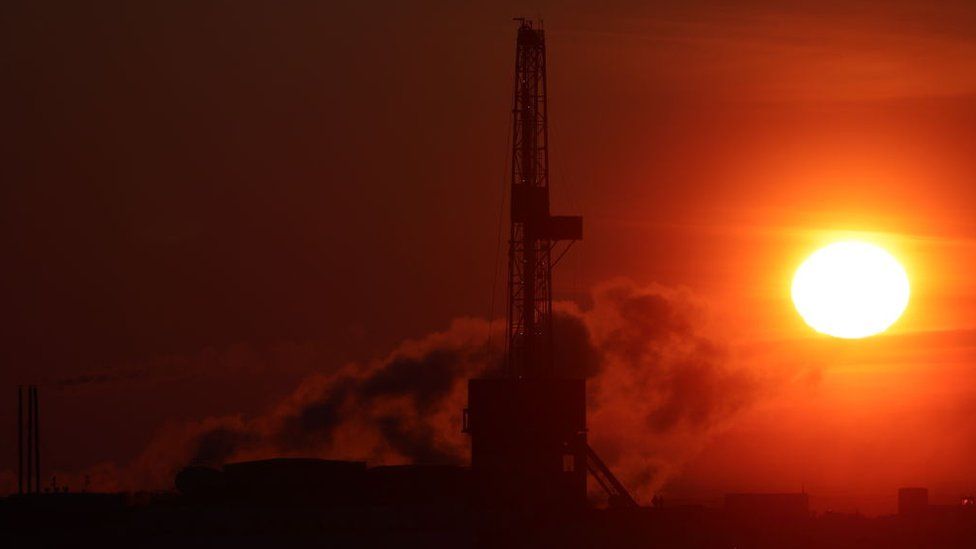
Firms want to be seen to be doing the “right thing”, says Russ Mould, investment director at AJ Bell.
Meanwhile, Total Energies, another big player in Russia, has said it won’t fund new projects in the country, but unlike its peers does not plan to sell existing investments.
It is still far from clear what will happen to those investments – whether they can eventually be sold, recouping some of their value, or if they will simply be written off at great cost.
Entertainment
Film fans in Russia wanting to go and see Warner Bros’ new blockbuster The Batman won’t be able to after the company suspended new film releases in the country.
The US movie-maker was joined by Disney and Sony, with premieres of animation Turning Red and Marvel adaptation Mobius also being withdrawn. Disney has also paused its TV channels.
Netflix, a fairly new entrant in Russia, has suspended its service in the country and put all “future projects” on pause.

All companies said their decisions were based on the “humanitarian crisis” in Ukraine, rather than as a result of sanctions that have been imposed.
Finance
Payment giants Visa, Mastercard, American Express and PayPal are pulling out of the Russian market in protest.
Russian banks have, however, already downplayed the impact of the announcements on their clients.
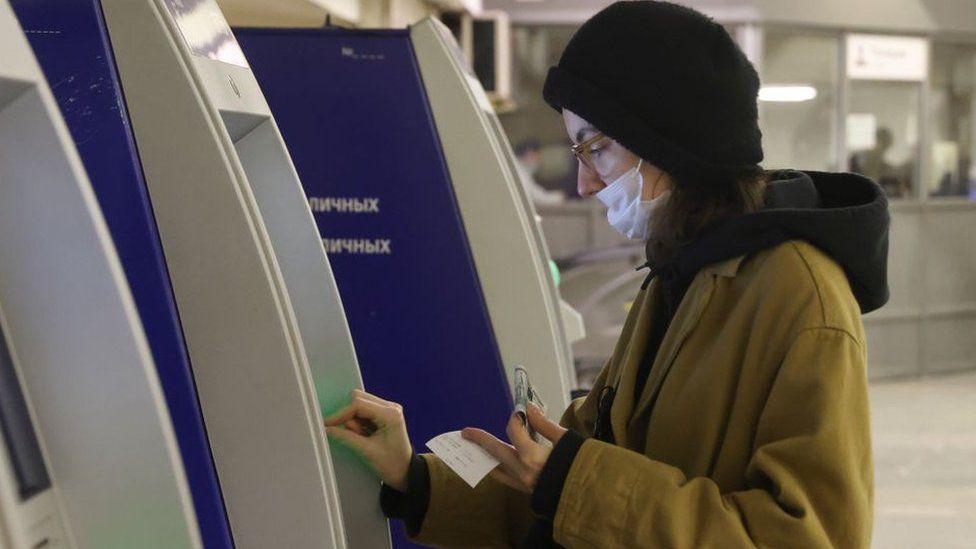 IMAGE SOURCE,GETTY IMAGES
IMAGE SOURCE,GETTY IMAGESSberbank, for example, said that Visa and Mastercard-branded cards would continue to work on Russian territory because all payments in Russia are made through a national system.
However, domestically issued cards won’t work abroad, and foreign-issued ones won’t work inside the country.
US investment bank Goldman sachs has said it is closing its operations in Russia, becoming the first Wall Street bank to pull out. The bank said it was doing so in compliance with regulatory and licensing requirements.
Cars
Jaguar Land Rover, General Motors, Aston Martin and Rolls-Royce are among the car-makers that have halted deliveries of vehicles to Russia due to the conflict, while construction equipment manufacturer JCB has paused all operations. 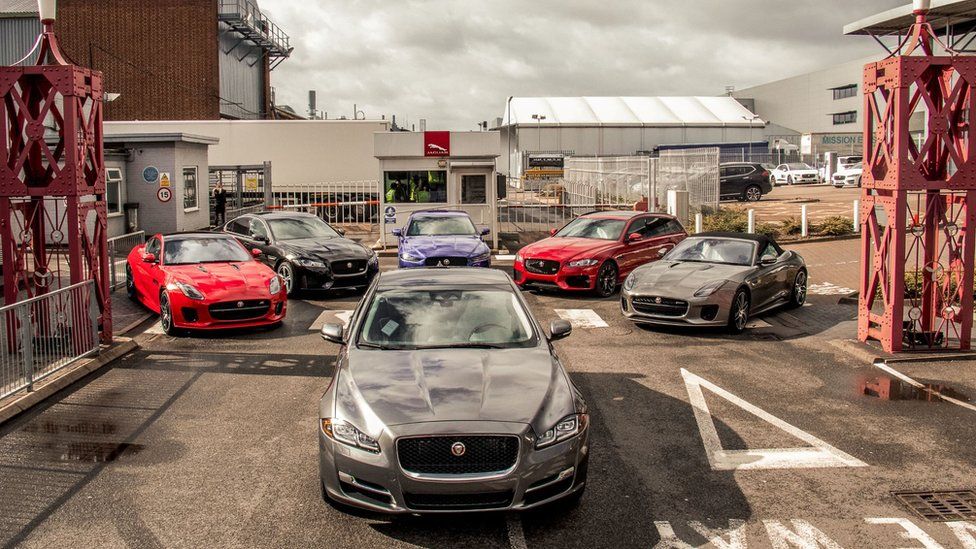
Cars are the biggest UK export to Russia, but still only 1% of UK cars went to Russia last year.
So any decision to stop exporting won’t be particularly costly, and will have been made easier by nagging concerns over whether or not payments will arrive, says investment analyst Russ Mould.
Transporting cars to Russia could prove difficult anyway, with the world’s two largest cargo shipping companies, MSC and Maersk, suspending routes to and from Russia, except for food, medical and humanitarian supply deliveries.
Which firms remain?
While the flood of announcements from companies stepping back goes on, there are calls for more to join them.
Attention has turned to big food firms like Burger King who have condemned Russia’s actions and have pledged support for Ukraine, but are yet to pull out.
Some firms will also find it much harder to extricate themselves, even if pressure mounts in the coming days and weeks.
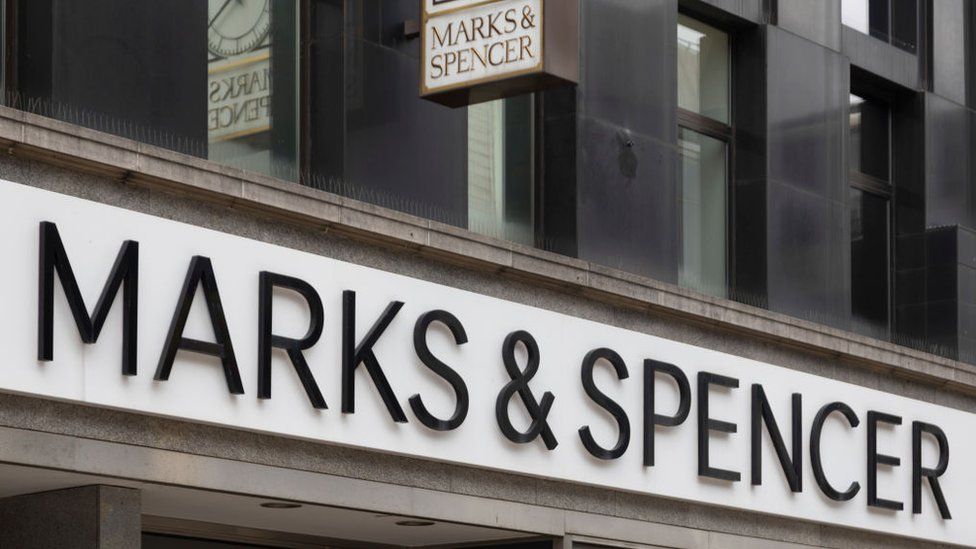
In retaliation against sanctions introduced by Western countries, Moscow has banned the sale of Russian assets. So firms that, in recent years, have been encouraged to establish a presence in Russia are “locked in” with local businesses, staff and supply chains.
Marks & Spencer, for example, has 48 shops in Russia but they are operated by a Turkish franchise company called FiBA. M&S has said it is suspending shipments of its goods to FiBA’s Russian business, but the shops in the country remain open.
Restaurant Brands International, which owns Burger King, said; it’s Russia outlets were operated by franchisees with which it had “long-standing legal agreements” that were not easy to change.
Yum Brands, which owns KFC and Pizza Hut, said it was suspending operations in the Russian KFC restaurants it owns, and finalizing an agreement with its main franchisee to temporarily halt Pizza Hut operations.
Mr Weafer predicts it is likely that some large consumer brands may express concerns over the military conflict, but try to “ride it out”.
For instance, British American Tobacco has said it is suspending its operations in Ukraine to ensure the “safety and wellbeing” of its staff, but its work in Russia will continue. It says it is complying will all international sanctions.
……………………………………………………………
A Royal Encounter at Madame Tussauds London - Part 7
Exploring the Majesty of the Palace and Its Distinguished Guests Greetings, ladies and gentlemen! My name is Sofonie Dala, and I am deligh...

-
Since the July 26 coup, Niger has become the latest hotbed of disinformation in the troubled Sahel region as West African powers grapple wit...
-
End of an Era: Angola Loses Former National Assembly President Fernando “Nandó” da Piedade Dias dos Santos 📢 Breaking News — Historic Mome...
-
Angolan President of Republic João Lourenço marked Saturday (26) the third year of his five-year in office, marked by the strong negative ...






